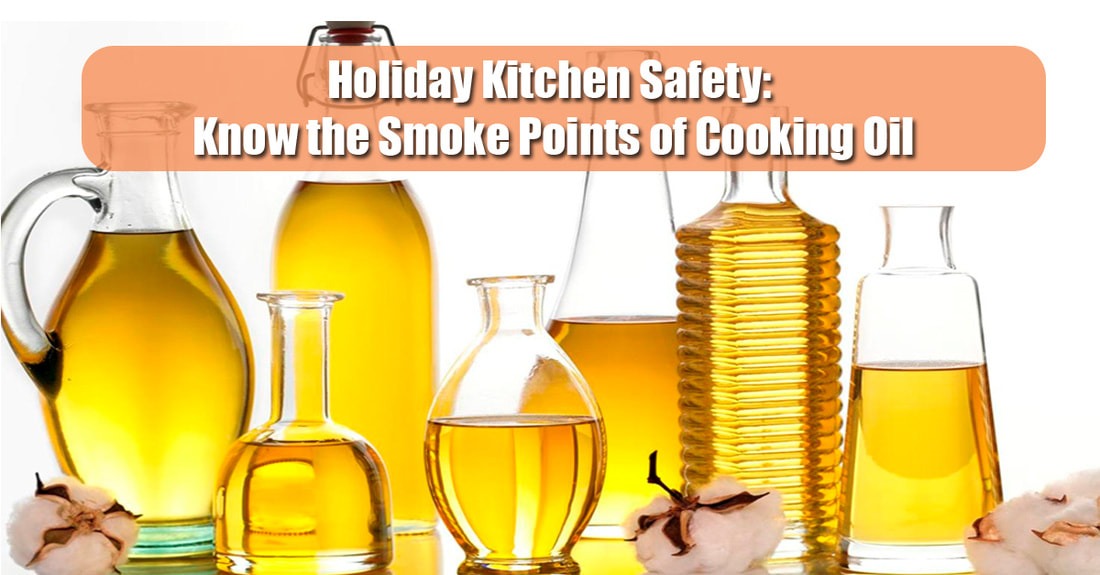Hot grease may bubble, froth, splatter — and, in the worst case, spread flames. In fact, frying poses the greatest risk of home cooking fires according to The National Fire Protection Association (NFPA).
Staying safe with cooking oils
Being attentive, relying on quality oils, and keeping your kitchen clear of kids, clutter, and other distractions can go a long way to staying safe in a holiday kitchen. Have a look at the chart below for general guidelines on the smoke points of various cooking oils.
- Coconut Oil – 381 degrees F
- Olive Oil – 410 degrees F
- Canola Oil 435 degrees F
- Soybean Oil – 415 degrees F
- Safflower Oil – 450 degrees F
- Sesame Oil – 410 degrees F
- Palm Oil – 433 degrees F
- Peanut Oil – 408 degrees F
What’s the biggest danger when cooking with hot oils?
When oil comes into contact with burners–gas flames or electric heating elements–it can ignite and spread through your kitchen. Water won’t help douse the fire; it vaporizes, becomes steam that expands, and may even spray hot water and oil. That’s why you should never to use water to extinguish a cooking oil fire.
What does “smoke point” mean?
All oils have a smoke point, the temperature at which they exhibit smoke above the frying pan, deep-frying pot, or wok. The exact temperature at which this happens varies depending on the type of oil and how it was manufactured or refined.
Also, be aware that the smoke point doesn’t remain constant throughout the cooking process; it keeps dropping as you continue to fry and the oil is exposed to more heat, which breaks down or degrades it into smaller compounds so it’s more prone to smoke, says Stier. Cooking at a lower temperature will help.
What about recycling or saving oil?
Saving oil for weeks or months poses another danger since it also may cause the oil to become unstable and degrade over time—and reach its smoke point sooner. The discriminating cook also knows that the oil will oxidize and develop off-flavors and aromas, which can be passed onto the food.
Are some oils less of a risk?
Yes; the more refined the oil, the safer it is, because it has fewer impurities. Extra virgin olive oil, for example, is considered unrefined and, therefore, not a good choice for frying; it’s better for light sautéing or dressing a salad, says Heine. Read labels to help you make buying decisions.
Are there signs that oil has reached a dangerous level?
Smoke coming from a frying pan or wok, or food burning, is a sure sign that the oil has become dangerous. Always use a dial thermometer enclosed in a metal case, rather than a glass thermometer, to check the temperature of your oils.
What about deep-fat frying a turkey?
Use equipment that’s large and sturdy, don’t use too much oil (don’t overfill the pan or pot), and cook outdoors, Gupta recommends.
Remember, smoke points will ultimately vary, based on oil quality, the level of refinement, and your cooking temperature. Always cook with caution!
At the SunGate Insurance Agency in Lake Mary, we care about the safety of our clients. We certainly hope our clients won’t ever deal with a major fire in the home but if it ever happened we know they’d be okay because we sell great insurance coverage from the best carriers. If you’re not thrilled with your current home insurance or just want to save a few dollars every month contact our agency at (407) 878-7979 or click here to get a quote.
Contact SunGate Insurance Agency today learn more about the type of insurance you need. Click here to contact us or call (407) 878-7979.
SunGate Insurance Agency Coverage
Home Insurance, Auto Insurance, Group Insurance, Property Insurance, RV Insurance, Renters Insurance, Event Insurance, Insurance Bonds, Life Insurance, Business Insurance, Workers Comp, Flood Insurance, Umbrella Insurance and more!
Located in Lake Mary, Florida (serving clients Nationwide and locally in Orlando, Heathrow, Longwood and surrounding Central Florida areas.





